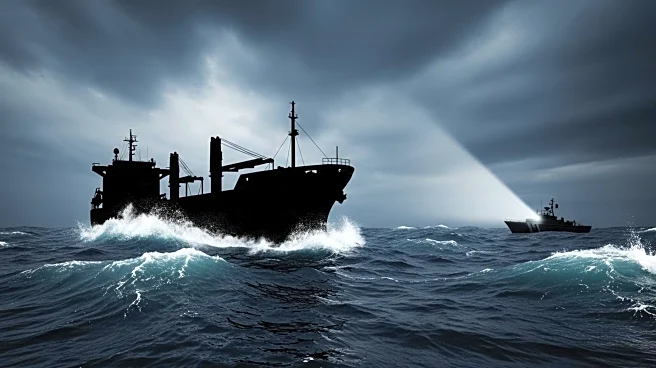What's Happening?
Israeli forces have intercepted a new aid flotilla heading towards Gaza, carrying food and medical supplies. The flotilla, consisting of nine vessels and 150 passengers, was stopped in international waters. The Israeli government stated that the passengers are safe and will be deported promptly. This interception follows a previous attempt where a 42-boat convoy with 479 activists was halted, resulting in detentions and deportations, including Swedish climate activist Greta Thunberg. The Israeli military's actions are part of a broader campaign in response to a Hamas-led attack on southern Israel on October 7, 2023, which resulted in significant casualties and hostages. Since then, Israeli attacks have led to over 67,160 deaths in Gaza, according to the territory's health ministry. The ongoing blockade has severely impacted Gaza's access to essential supplies, contributing to a humanitarian crisis marked by malnutrition-related deaths.
Why It's Important?
The interception of the aid flotilla highlights the ongoing humanitarian crisis in Gaza, exacerbated by the Israeli blockade and military actions. The blockade, in place since 2007, restricts the flow of goods and aid, leading to severe shortages and malnutrition. The United Nations-backed Integrated Food Security Phase Classification has confirmed a famine in Gaza City, warning of its potential spread. The situation underscores the urgent need for international intervention and sustained humanitarian aid to prevent further deterioration. The blockade and military actions have drawn international criticism, with countries like Turkey condemning the interception as a violation of international law. The humanitarian impact is profound, affecting thousands of civilians and straining Gaza's healthcare system.
What's Next?
The intercepted passengers are expected to be deported, and the vessels transferred to an Israeli port. The international community may increase pressure on Israel to allow humanitarian aid into Gaza. The ongoing conflict and blockade could lead to further diplomatic tensions, particularly with countries whose citizens were involved in the flotilla. Humanitarian organizations may intensify efforts to provide aid through alternative channels. The situation remains volatile, with potential for further escalations in military actions and humanitarian needs.
Beyond the Headlines
The interception of the aid flotilla raises ethical and legal questions about the rights of civilians in conflict zones and the responsibilities of nations under international law. The blockade's impact on Gaza's civilian population highlights broader issues of human rights and the need for conflict resolution. Long-term, the situation could influence international policies on humanitarian aid and conflict management, potentially reshaping diplomatic relations in the region.











